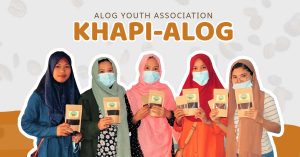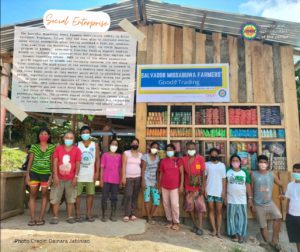ECOWEB’s STATEMENT ON WORLD HUMANITARIAN DAY 2021
Today, as we celebrate the World Humanitarian Day 2021, there is an emphasis on the human cost of the climate crisis, particularly its impacts and effects on the most vulnerable people. ECOWEB walks with all of you to take part in telling the world that there is a lot that we can do for climate mitigation and adaptation.
Every year, this day is observed to pay respect to all humanitarian workers and honor all people who have chosen to support, serve, and give life-saving assistance and protection to those in need. As they continue to dedicate their lives to the human race in the fight of the various global issues and crisis, we also want to make this as a call to our local, national and world leaders to take more concrete steps to combat climate crisis and save lives – just as much as we want to protect the lives of our #RealLifeHereos.
#TheHumanRace – The United Nations has launched this theme and campaign as a global challenge for climate action. The theme has transpired in this year’s WHD celebration in highlighting the immediate consequences of the climate crisis to vulnerable people and ensuring that their voices are being heard and amplified.
ECOWEB is in solidarity with the world’s most vulnerable populations and all humanitarian and development actors and acknowledging that humanity is indeed racing against the clock of the climate emergency. There are a lot to celebrate today, especially recognizing the efforts of the people who carried out many acts of bravery, delivered services and programs to different communities, provided safe spaces, and elevated local actions during times of disaster and crisis.
For the past years until this day, ECOWEB has initiated humanitarian and crisis responses advocating the Survivor and Community-Led Response (sclr) approach. ECOWEB also seeks to localize responses to global climate concerns as communities have to face growing vulnerabilities to natural, human-induced and climate-related disasters. ECOWEB proactively promotes community-based disaster risk reduction and integrated risk management and endeavors to help strengthen the resilience and capacity of people in upholding their rights and dignity amid their vulnerabilities
Part of the efforts is ECOWEB’s program benefiting the indigenous communities in the island of Mindanao, Philippines. ECOWEB through EcoSustain Solutions (EcoSSol) and in partnership with Bread for the World, assist farmers to develop a social enterprise and improve abaca farmers capacity to improve income and productivity in an environmentally sustainable manner. More than 900 farming families are formed into production guilds, provided with technical, material and financial support to develop at least 1,600 hectares of sustainable abaca farms.
One locally-initiated climate action that deserves spotlight is the launching of the first local government-implemented solar powered irrigation system project in the Philippines. Through the financing from the Development Bank of the Philippines and support from Mindanao Development Authority (MinDA), the LGU of Taraka in Lanao del Sur has made this possible! Christian and Muslim rice farmers will jointly develop a 200-hectare rice farm served by two-Solar Powered Irrigation Systems (SPIS) to produce the Mindanao Halal Premium Rice. This aims to bring together Muslim and Christian farmers in a technology sharing strategy. ECOWEB, as one of MinDA’s partners, advocates for organic farming and with MinDA and Taraka LGU in the project planning of Halal Premium Rice in developing sustainable rice farming and economic development for the municipality.
ECOWEB also partners with various local communities and local governments in Mindanao and Visayas in initiating participatory climate change adaptation and community-based disaster risk reduction actions.
With the digital shift caused by the pandemic, ECOWEB also strongly advocates for people’s access to digital technology for their feedbacking to government, humanitarian and development actors. ECOWEB co-facilitated the launching of “Talk to Loop” in the Philippines. Loop is an independent digital feedbacking platform that hopes to serve the needs and facilitate the hearing of feedback, views and perspectives of the most marginalized, disadvantaged, underserved, and vulnerable individuals. Loop believes that by providing an easy-to-use feedback system based on open data ownership and transparency principles, it can reduce some of the underlying power dynamics that currently exist in the global aid industry and humanitarian system. As part of the WHD movement to listen from the people, Loop will empower individuals and groups to speak up and share their stories and experiences in a secure, open, and transparent environment aimed to result to long-term systemic change including in the fight against the impact of global climate crisis.
With a collective and proactive framework approach, ECOWEB believes humanity can better address climate emergency and crisis.
The world is being ravaged by the climate change induced disaster including pandemics on a scale that those on the front lines and in the humanitarian community cannot handle. For the world’s most vulnerable people and to those millions who are already losing their homes, businesses, and lives, time is indeed running short! The COVID-19 pandemic exacerbated people’s suffering around the globe and highlighted more of our systems’ long-standing flaws and our ecosystems’ fragility. The humanitarian community are already much overwhelmed by the ballooning humanitarian crisis while have to work on limited funding to address not only climate-related disasters and risks but the humanitarian impact as well as geological disasters, wars and conflicts.
This year’s observance of the WHD urges everyone and the world leaders to take meaningful climate actions. But today we also have to think of the millions of people affected of the war in Afghanistan and other parts of the globe. In Mindanao, Philippines, many communities are also continually suffering the impact of violent conflicts while have to face the climate hazards in their daily living.
History of humanity has always been fighting against nature and against one another for control of resources and power. Power imbalance between nature and humans and between humans result to disasters, crisis and catastrophes that we are trying to address through humanitarian actions and aid.
But humanitarian and development aid system are also characterized by power imbalance that resulted to ineffective, inefficient, and insufficient humanitarian and development actions.
Localisation and participatory revolution are among the power shifting change in the humanitarian sector recognized to be necessary to effectively deliver humanitarian aid. But 5-years since the making of this commitment during the World Humanitarian Summit in 2016, power imbalance remain a barrier in ensuring that rights and dignity of the crisis-affected people are made at the center of aid.
ECOWEB advocates on going forwards and moving onwards. With this race against the climate crisis, we are taking our steps bigger and it is the best time to not go backwards and leave no one behind.
With more and more people in this fragile planet put at risk, we call on those holding more power and resources to enable the affected of crisis real partner in finding durable solutions to the crisis that they are facing. We also call on those who greatly contributed to climate change to contribute more as well to climate action.
—
Want a copy of ECOWEB’s statement for the World Humanitarian Day 2021? DOWNLOAD HERE.



